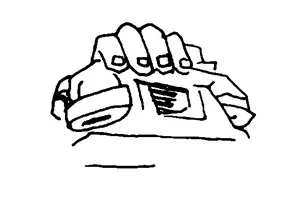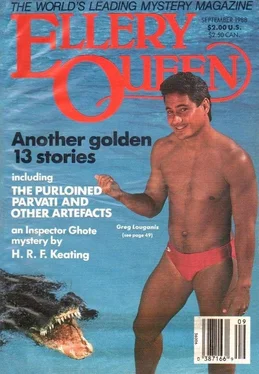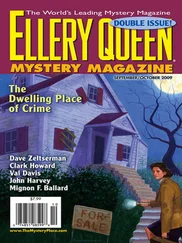William Bankier - Ellery Queen’s Mystery Magazine. Vol. 92, No. 3. Whole No. 547, September 1988
Здесь есть возможность читать онлайн «William Bankier - Ellery Queen’s Mystery Magazine. Vol. 92, No. 3. Whole No. 547, September 1988» весь текст электронной книги совершенно бесплатно (целиком полную версию без сокращений). В некоторых случаях можно слушать аудио, скачать через торрент в формате fb2 и присутствует краткое содержание. Город: New York, Год выпуска: 1988, Издательство: Davis Publications, Жанр: Детектив, на английском языке. Описание произведения, (предисловие) а так же отзывы посетителей доступны на портале библиотеки ЛибКат.
- Название:Ellery Queen’s Mystery Magazine. Vol. 92, No. 3. Whole No. 547, September 1988
- Автор:
- Издательство:Davis Publications
- Жанр:
- Год:1988
- Город:New York
- ISBN:нет данных
- Рейтинг книги:5 / 5. Голосов: 1
-
Избранное:Добавить в избранное
- Отзывы:
-
Ваша оценка:
- 100
- 1
- 2
- 3
- 4
- 5
Ellery Queen’s Mystery Magazine. Vol. 92, No. 3. Whole No. 547, September 1988: краткое содержание, описание и аннотация
Предлагаем к чтению аннотацию, описание, краткое содержание или предисловие (зависит от того, что написал сам автор книги «Ellery Queen’s Mystery Magazine. Vol. 92, No. 3. Whole No. 547, September 1988»). Если вы не нашли необходимую информацию о книге — напишите в комментариях, мы постараемся отыскать её.
Ellery Queen’s Mystery Magazine. Vol. 92, No. 3. Whole No. 547, September 1988 — читать онлайн бесплатно полную книгу (весь текст) целиком
Ниже представлен текст книги, разбитый по страницам. Система сохранения места последней прочитанной страницы, позволяет с удобством читать онлайн бесплатно книгу «Ellery Queen’s Mystery Magazine. Vol. 92, No. 3. Whole No. 547, September 1988», без необходимости каждый раз заново искать на чём Вы остановились. Поставьте закладку, и сможете в любой момент перейти на страницу, на которой закончили чтение.
Интервал:
Закладка:

Detectiverse
Case Clothed
by William C. Thomas
© 1988 by William C. Thomas.
I’d like to travel back through time
And solve some great Victorian crime
In ancient, foggy London town
With bent-stemmed pipe and dressing gown
Or inverness and fore-and-aft
Or ulster coat to stop the draft
Or black-silk cape and opera hat
Or smoking jacket and cravat
Or macintosh for when it rains
Or cloak for stalking dockside lanes.
I’d like to travel back through time
And solve some great Victorian crime—
And yet, my word, do you suppose
I simply wish to wear the clothes?
Hugo Skillicorn and the Killing Machine
by Peter Turnbull
© 1988 by Peter Turnbull.
A nurse in a starched white smock stood in the corridor, which smelled of disinfectant. The tall windows allowed the interior of the hospital to flood with light and permitted an impressive view of the rooftops of Battlefield and Langside. Sussock saw an orange bus go down Battlefield Road, and away in the far, far distance the sun caught a window of a house, causing it to gleam penetratingly, like a diamond in a sea of granite and concrete.
“Mr. Sussock?” said the nurse. Sussock found her demure and genuinely respectful, not just of him as a cop but of him as a human being. She immediately brought out his sense of protectiveness. He nailed felons to protect citizens like this nurse...
Donoghue pulled reflectively on his pipe and thought that they should come here, all those people who thought of Glasgow as square mile upon square mile of tenements, of disused mine and railway workings, of cranes against a grey sky hovering over an oily river, of pale children playing in stinking streets. They should come here, he told himself, to this quarter of the city, to houses like this — large, stone built, with fifteen rooms and landscaped gardens. And it was the home of just one man and his wife, exactly as the other houses in the street in Maxwell Park were single-family units. Not for these houses the ignominy of being split into bedsits or sold off as conversion flats within the shell of the original building, which in Donoghue’s values was only better than demolition.
He watched a swallow curl and dive in pursuit of a flying insect and he thought, too, that people who imagined the weather north of the border to be all mist, rain, sleet, and snow should visit Scotland at this time of the year — high summer, just a week after the longest day but still in the brief “white nights” period when it never really got dark.
It was only because he was a policeman with twenty years’ experience and because he was a professional that he had been able to muster the detachment to walk out of that house, to enjoy the evening and the neighborhood. He was aware that police work affects every cop and that the effect isn’t noticed by the individual officer until it has arrived and is entrenched. He had first realized this twenty years earlier when he was still a fresh-faced cop, still in uniform. He had been obliged, along with colleagues and ambulance and fire-service crews, to attend yet another car smash. It had been a very bad one — one car had been crushed into a mass half its original size and inside were the mangled remains of five human beings, none older than himself. He had helped remove the bodies.
Later he had gone home and eaten a plate of fish and chips, which he had smothered liberally with tomato ketchup, then he had gone to the pub and had a beer or two. Only at the close of the day did he suddenly realize that as a policeman, accumulating the sort of experiences that come to most people only once a lifetime, he had calmly taken in his stride a trauma that would otherwise have shaken him badly. Now, years later, he found himself calmly taking the air and enjoying the evening when inside the house was a woman whose life had all but come to an end, who now sat in a state of numbed shock in a chair in the drawing room, attended by W.P.C. Willems, while in the dining room her husband’s life had completely come to an end. Bloodily.
Dr. Chan, the police surgeon, had pronounced death within fifteen seconds of kneeling beside the body and then systematically began to count the stab wounds.
“Fifteen in the front of the torso,” he said. “There may be others in the rear of the body, but I won’t move him, of course — it might interfere with the work of the pathologist.” Chan was a small Oriental — always, thought Donoghue, highly professional. He had then stood, saying, “I’d like to stay to observe the pathologist’s work, but I have a sudden death in Maryhill.”
Donoghue thanked him as the doctor left the house, the locus of the offense. In the dining room, two constables stood reverently in the corner and a scene-of-crimes officer began to make ready his camera. The smell of death was beginning to rise. It was always the same smell — not unlike dried leaves, but sweeter and mustier. From women, from men, from the young, from the old, from the poor or from, as in this case, the rich, it was always the same. It was at that point that Donoghue, knowing his presence was not immediately required, had gone outside to enjoy the evening, and to wait for the arrival of Dr. Reynolds.
He strolled to the bottom of the drive and noticed the occasional curtain move in one or another of the neighboring houses as the police activity attracted attention. But the people who lived in Maxwell Park were discreet and polite, not venturing from their homes. In the sprawling peripheral housing schemes, any similar activity on the part of the police would cause a crowd to gather, blatantly staring, hoping to catch a glimpse of the corpse or of the arrest or whatever, but not here where the stockbrokers lived. Here, although they would surrender to a little curiosity, people minded their own affairs.
Donoghue turned and walked back up the driveway to the side of the house and then round to the rear. The only sounds were his shoes crunching the gravel and the birds singing in the warm, placid Sunday-evening air. He felt quite at home in these surroundings and, with his tailored three-piece suit, gold hunter’s-chain looping across his waistcoat, and his pipe with its slightly curved stem, he would, to an onlooker, seem indeed to be quite at home. The garden at the rear of the house was landscaped. There were rockeries, shrubberies, and croquet hoops in the lawn.
A car door slamming shut penetrated the still evening and Donoghue returned to the side of the house and saw Dr. Reynolds striding purposefully up the drive. He walked toward the tall silver-haired pathologist. “Good evening, sir,” he said.
“Good evening, Inspector.” Reynolds nodded cheerfully. “What have you got for me?”
“One male, middle-aged, sir,” said Donoghue. “Dr. Chan has pronounced him dead. Apparently from stab wounds.”
“Apparently?”
“Well, that’s really your department, sir.” Donoghue invited Reynolds to enter the house in front of him. “But even a layman could say that the number of wounds involved wouldn’t have done his health the world of good.”
Reynolds stepped over the threshold into the hallway. Oak panels, imposing stairway. “What was the deceased’s profession, do you know?”
“He was a medical man, I believe, sir. An obstetrician.”
“Opposite side of the coin to me, eh? He brings them into the world, I find out what caused them to leave. Where’s the corpse?”
“First door on the right, sir.”
Читать дальшеИнтервал:
Закладка:
Похожие книги на «Ellery Queen’s Mystery Magazine. Vol. 92, No. 3. Whole No. 547, September 1988»
Представляем Вашему вниманию похожие книги на «Ellery Queen’s Mystery Magazine. Vol. 92, No. 3. Whole No. 547, September 1988» списком для выбора. Мы отобрали схожую по названию и смыслу литературу в надежде предоставить читателям больше вариантов отыскать новые, интересные, ещё непрочитанные произведения.
Обсуждение, отзывы о книге «Ellery Queen’s Mystery Magazine. Vol. 92, No. 3. Whole No. 547, September 1988» и просто собственные мнения читателей. Оставьте ваши комментарии, напишите, что Вы думаете о произведении, его смысле или главных героях. Укажите что конкретно понравилось, а что нет, и почему Вы так считаете.












